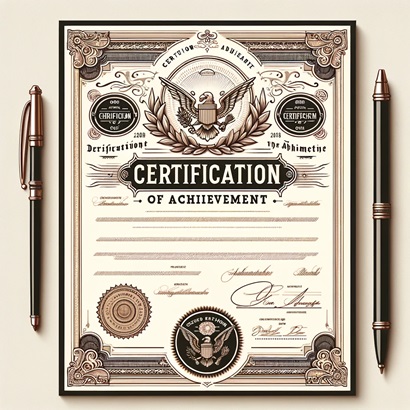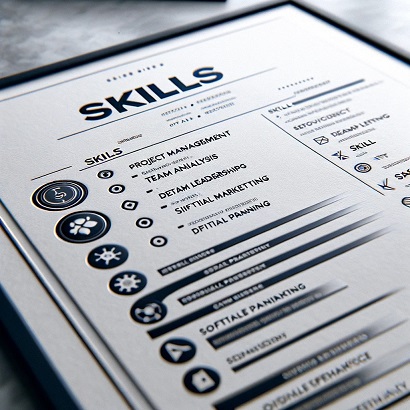The job application process has evolved significantly in the current job market. Gone are the days when you could simply print out your
resume and hand it to a hiring manager. Nowadays, the first hurdle in your job search journey is often an automated one: the resume-scanning bot.
These algorithms play a pivotal role in processing countless resumes, helping recruiters identify potential candidates efficiently. However,
as a job seeker, understanding the importance of skills in this process can make all the difference in getting noticed.
The Rise of Resume-Scanning Bots
Resume-scanning bots, or applicant tracking systems (ATS), have become ubiquitous in the hiring process. Their primary purpose is to help employers
filter through the ever-increasing number of applications they receive for job postings. While they may seem impersonal, these bots are instrumental
in streamlining the recruitment process and ensuring that recruiters can focus their time and energy on reviewing qualified candidates.
The basic operation of these ATS relies on keyword matching and algorithms to assess resumes. They search for specific qualifications, skills, and
experience levels that match the job requirements. When your resume is submitted online, it is almost certain that it will first go through this
digital gatekeeper before reaching human eyes. This is where skills come into play as a crucial factor in determining whether your
application progresses or gets stuck in the digital abyss.
The Significance of Skills
Skills are the lifeblood of your resume, and they form the backbone of what ATS systems use for evaluation. Here are some reasons why skills
are so crucial in the selection process undertaken by bots:
-
Keyword Matching: ATS systems rely heavily on keyword matching. The more your resume aligns with the specific keywords and
phrases used in the job description, the better your chances of making it through the initial screening. These keywords are often skills or
qualifications deemed essential for the role. Therefore, including relevant skills on your resume is vital.
-
Qualification Assessment: Skills also serve as indicators of your qualifications. Whether it's technical skills like programming
languages or soft skills like communication and teamwork, they provide insight into your suitability for the job. The more skills you possess that
match the job's requirements, the higher your chances of getting noticed.
-
Sorting and Ranking: ATS systems not only scan for keywords but also sort and rank resumes based on the match level.
A resume with a high match percentage to the job description is more likely to be shortlisted. By including relevant skills on your resume,
you increase your chances of achieving a high match percentage.

The Limitations of a Skills Section
A typical resume includes a "Skills" section where you can list various skills you possess. While this section provides a quick overview of your qualifications, it has limitations:
- Lack of Context: In the "Skills" section, skills are often listed in isolation, providing no context on how and where you've used them.
- Generic Presentation: Many job seekers list similar skills, making it challenging to differentiate themselves from other candidates.
- Limited Impact: Employers value not only the skills you possess but also how effectively you can apply them in a work environment. A simple list of skills may not adequately convey this.
Why Demonstrating Skills in Your Work History Matters
To make your resume more compelling, it's crucial to go beyond the traditional "Skills" section and integrate your skills into your work history. This approach offers several advantages:
- Contextual Relevance: When you mention specific skills in the context of your work experiences, it provides a clear understanding of how and where you've applied them.
- Highlight Achievements: You can demonstrate your proficiency by showcasing the results and achievements that resulted from using those skills.
- Personalization: Tailoring your resume to match the job posting becomes more effective when skills are integrated into your work history, making it clear how well you align with the job requirements.
- Engaging Narratives: A well-structured resume that weaves skills into your work history can create engaging narratives that capture the attention of employers.
Resume Optimizer Pro: Seamlessly Integrating Skills into Your Work History
At Resume Optimizer Pro, we recognize the significance of integrating skills into your work history to create more impactful resumes. Our AI-powered platform offers a unique solution to this challenge:
- Skill Comparison: When you submit your resume for optimization, Resume Optimizer Pro assesses your skills and matches them with the job requirements. We generate a list of skills required for the position.
- Skill Integration: Once you've chosen your skills, Resume Optimizer Pro's AI takes the reins. It organically incorporates these skills into your work history, ensuring they appear in the relevant job descriptions and achievements.
- Enhanced Alignment: The result is a resume that not only lists your skills but also demonstrates how you've used them to achieve goals and contribute to your previous roles. This enhanced alignment with the job's requirements significantly improves your chances of securing the position.
Most In-Demand Skills for 2026
As we navigate through 2026, the professional landscape demands an evolving skill set. Understanding which skills employers prioritize can significantly strengthen your resume and increase your marketability across industries.
Technology Sector
In the technology industry, artificial intelligence and machine learning capabilities top the list. Proficiency in Python, TensorFlow, and PyTorch remains essential. Cloud computing expertise, particularly with AWS, Azure, and Google Cloud Platform, continues to be highly valued. Cybersecurity skills including penetration testing, threat analysis, and security compliance have become non-negotiable as data breaches pose increasing risks. Additionally, full-stack development skills combining React, Node.js, and modern database technologies remain in high demand.
Healthcare Industry
Healthcare professionals must demonstrate digital health literacy as telemedicine and electronic health records become standard practice. Data analysis skills for interpreting patient outcomes and operational metrics are increasingly important. Knowledge of healthcare compliance regulations including HIPAA and patient privacy standards is essential. Clinical professionals should highlight specialized certifications and continuing education in emerging treatment methodologies. Healthcare administrators benefit from showcasing experience with healthcare management systems like Epic or Cerner.
Finance and Banking
The finance sector prioritizes financial modeling and analysis capabilities using advanced Excel, SQL, and specialized software like Bloomberg Terminal or Tableau. Risk management and regulatory compliance expertise, particularly regarding anti-money laundering and KYC protocols, commands premium value. Understanding of blockchain technology and cryptocurrency markets has transitioned from novel to expected in many roles. Data visualization skills that translate complex financial information into actionable insights are highly sought after. Fintech experience, including knowledge of digital payment systems and robo-advisory platforms, gives candidates a competitive edge.
Universal Skills Across Industries
Regardless of your industry, certain skills maintain universal value in 2026. Digital communication and collaboration proficiency demonstrates your ability to thrive in hybrid work environments. Project management capabilities, whether through formal certifications like PMP or practical experience with Agile methodologies, remain crucial. Data literacy, the ability to interpret and make decisions based on data, has become as fundamental as traditional literacy. Change management skills reflect your capacity to guide organizations through constant transformation. Finally, emotional intelligence and cross-cultural communication skills prove invaluable as workplaces become increasingly diverse and global.
Industry-Specific Skills Integration Examples
Let's examine how professionals across different sectors can effectively integrate industry-specific skills into their work history to maximize ATS performance and demonstrate expertise.
Technology Example
Position: Senior Software Engineer at Tech Innovations Inc. (2022-2025)
Skills Integration: "Architected and deployed microservices infrastructure using Python, Docker, and Kubernetes, improving system scalability by 300%. Led team of 5 developers utilizing Agile methodology and Git version control to deliver cloud-native applications on AWS. Implemented CI/CD pipelines using Jenkins, reducing deployment time from 2 hours to 15 minutes."
This example seamlessly weaves technical skills (Python, Docker, Kubernetes, AWS, Jenkins, Git) into achievement-focused descriptions while demonstrating both technical expertise and measurable outcomes.
Healthcare Example
Position: Registered Nurse at Metro Medical Center (2020-2026)
Skills Integration: "Provided patient-centered care utilizing Epic EHR system to maintain accurate medical records and coordinate treatment plans. Applied critical thinking and clinical assessment skills to monitor 6-8 patients per shift in cardiac care unit. Demonstrated cultural competency while serving diverse patient population. Collaborated with multidisciplinary teams using SBAR communication technique to ensure seamless care transitions."
This effectively incorporates both technical healthcare skills (Epic EHR, clinical assessment, SBAR) and soft skills (patient-centered care, cultural competency, teamwork) within the context of daily responsibilities.
Finance Example
Position: Financial Analyst at Global Investments LLC (2021-2026)
Skills Integration: "Conducted financial modeling and forecasting using Excel VBA and SQL to analyze investment opportunities totaling $50M. Performed risk assessment and due diligence applying regulatory compliance frameworks including Dodd-Frank and SOX requirements. Created executive dashboards using Tableau to visualize portfolio performance, enabling data-driven decision making that improved ROI by 18%."
This example demonstrates proficiency in both technical tools (Excel VBA, SQL, Tableau) and industry-specific knowledge (regulatory compliance, risk assessment, financial modeling) while quantifying business impact.
Frequently Asked Questions
How many skills should I include in my resume?
Focus on 10-15 highly relevant skills that align with your target job description. Prioritize skills mentioned in the job posting and those where you have substantial experience. Quality and relevance matter more than quantity.
Should I list skills I'm still learning?
Only include skills where you have practical, demonstrable experience. If you're actively developing a skill, consider adding it with a qualifier like "developing proficiency in" or wait until you've applied it in a professional context.
How do I update outdated skills on my resume?
Remove obsolete technologies and replace them with current equivalents. For example, update outdated programming languages or software versions with modern alternatives. Ensure your skills section reflects tools and methodologies currently used in your industry.
What's the difference between hard skills and soft skills on a resume?
Hard skills are technical, teachable abilities like programming languages, data analysis, or financial modeling. Soft skills are interpersonal qualities like communication, leadership, or problem-solving. Both are important, but hard skills are easier to verify and often prioritized by ATS systems.
Conclusion
A well-crafted resume goes beyond simply listing your skills in a dedicated section. It should tell a compelling story of how you've applied those skills in your work history.
Resume Optimizer Pro empowers you to seamlessly integrate skills into your work experiences using the power of AI.
By doing so, your resume becomes a powerful tool that not only showcases your qualifications but also demonstrates your ability to excel in your roles.
Related Articles

Learn the importance of aligning your resume skills with job description requirements and discover how Resume Optimizer ...
Read More

Learn how showcasing technical skills and certifications on your resume can significantly boost your chances of landing ...
Read More

Explore effective techniques for integrating essential soft skills into your resume to catch the eye of recruiters and e...
Read More




